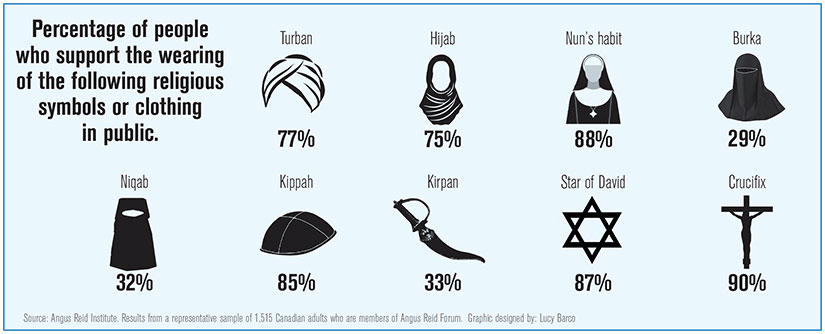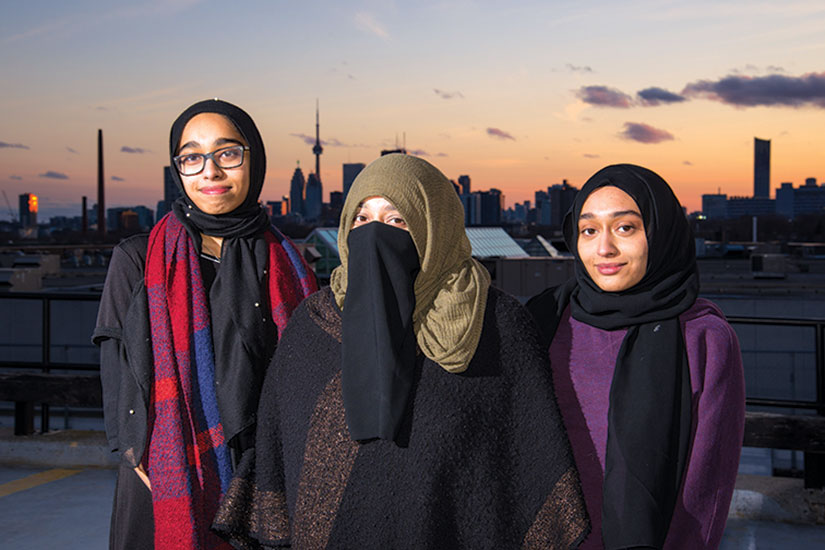“I was just loading my groceries in the car and a man comes up to us,” Desai recalled. “Because I was wearing the niqab he says, ‘So little boy, when are you going to join the ISIS?’ ”
Desai’s son, Bilal, had no idea what the man was talking about.
“How dare you talk to my little baby like that?” asked Desai before bundling her boy into the car.
“Just because I wear a niqab doesn’t mean you can pick on my baby boy like that.”
Desai is a Toronto-born mother of four — a part-time school bus driver devoted to her family and to her faith. She’s anxious to defend her hometown as open and accepting.
“In Toronto, it’s actually OK,” she told The Catholic Register. “When I go outside of Toronto, that’s when the stares come…. In Toronto people are not exactly used to it, but they’re beginning to understand the whole reason why we wear a niqab. It’s not as bad.”
Nationally, a recent survey from the the Angus Reid Institute found that only one in three Canadians support a person wearing the niqab — a veil which covers the face below the eyes. The same poll found that 46 per cent of Canadians view Islam unfavourably, as opposed to 33 per cent who have a generally favourable view.
There is also significant disapproval of the religious garb of devout Muslim women — the niqab with 32 per cent acceptance and the burka with 29 per cent. Clothing that declares a different, more familiar, piety gets broad support from Canadians. The most widely supported is the traditional habits of Catholic religious women, supported and approved of by 88 per cent of Canadians. The kippah or yarmulke worn by many Jewish men gets 85 per cent support. Turbans required of Sikh men are supported by 77 per cent. Even the hijab or headscarf worn by many Muslim women has 75 per cent support.
Contempt for faith and for public displays of faith is an old form of hatred and one Pope Francis has spoken out against.
“People who speak badly about religions or other religions, who make fun of them, who make a game out of the religions of others, are provocateurs,” Pope Francis told reporters just after the 2015 attack which killed 12 employees of the French satirical weekly Charlie Hebdo. “And if they go past the limit of acceptable speech, violent retaliation is to be expected…. There is a limit.”
It was not a popular stance when there was widespread outrage over the murdered cartoonists and writers, but Pope Francis has been a consistent advocate for what he calls “healthy pluralism which respects differences and values them as such.”
 Source: Angus Reid Institute. Results from a representative sample of 1,515 Canadian adults who are members of Angus Reid Forum. Graphic designed by Lucy Barco
Source: Angus Reid Institute. Results from a representative sample of 1,515 Canadian adults who are members of Angus Reid Forum. Graphic designed by Lucy Barco
In Philadelphia in 2015, Pope Francis directly addressed immigrants whose customs and faith are at odds with the mainstream. “Please, you should never be ashamed of your traditions,” he said.
“By contributing your gifts, you will not only find your place here, you will help to renew society from within.”
But will we let them?
Desai knows well that if either of her daughters — 17-year-old Faizah or 14-year-old Habeebah — were to adopt the niqab, it would slam the door on career opportunities and shrink their social circles.
“Yes, people obviously are going to judge us because of that one little piece of cloth we wear on our face,” she said. “They don’t understand that it doesn’t take long to get behind that one piece of cloth and we’re just regular people.”
“Right now, we’re in a situation where Islam has become identified with terrorism and all kinds of terrible things,” said Mosaic Institute executive director Bernie Farber. “Every Muslim in Canada becomes wrongly identified with this. We have a lot to learn about what Canadian Muslims are, what Islam is and what it isn’t.”
Farber is the former CEO of the now defunct Canadian Jewish Congress and a long-time campaigner for religious freedom and against religious bigotry. He has become convinced that Islamophobia is a real stumbling block on the road to a just and equal society. The Mosaic Institute runs programs largely geared to educating young Canadians about each other’s faiths and traditions.
For Farber, religious freedom is not a gift to be selectively bestowed but a human right because faith is part of being human.
“There has to be an intentional process,” said Farber. “And it’s a piece of the puzzle that we’re missing here in Canada. We call ourself a pluralistic, multicultural, multi-faith society — which we are. But it’s not really reflected that way. Where should it best be reflected? Obviously in the education system.”
The problem, says Farber, is that in the process of taking the Christian bias out of Ontario’s public schools (where school days used to begin with the Lord’s Prayer) we somehow lost our sense of the value of religion.
“There’s such a fear that if you introduce even the study of religion into the school system that all of a sudden it becomes indoctrination. No,” Farber said. “We have to have proper course curriculum in understanding the faiths of the world, so they become less foreign to us.”
Desai and her husband Yunis live within an easy walk of their mosque. They keep an immaculate garden, are active in the neighbourhood association and their children, from three-year-old Mohammed on up, are liked and admired up and down the street. She wishes more Canadians would take the time to understand her faith.
“They gotta understand that Muslims are not bad. Islam teaches us peace. Because of the way we dress, you cannot treat us any differently. This is part of our religion and we wish to follow it…. It gives us comfort. It makes us feel stronger Muslims.”
 Sumaiya Desai, centre, realizes if her daughters Habeebah, left, and Faizah were to adopt the niqab, they would face much difficulty in Canada. (Photo by Michael Swan)
Sumaiya Desai, centre, realizes if her daughters Habeebah, left, and Faizah were to adopt the niqab, they would face much difficulty in Canada. (Photo by Michael Swan)


